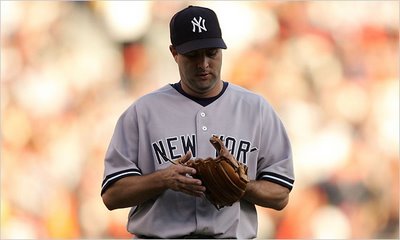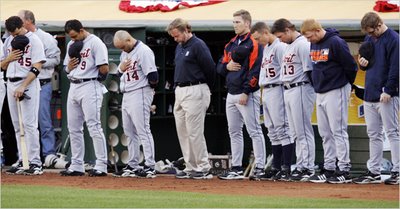
Cory Lidle locker at Yankee Stadium was on the opposite side of the empty stall next to the trainer’s room. That is the locker that belonged to Thurman Munson, the Yankees’ captain who died in the crash of a plane he was piloting on Aug. 2, 1979.

The Detroit Tigers observing a moment of silence Wednesday night for the Yankees’ Cory Lidle.
Lidle cleaned out his locker on Sunday, the day after the Yankees were eliminated from the playoffs. As he chatted informally with reporters, Lidle talked about aviation, a favorite topic of his since he earned his pilot’s license in four and a half months last winter.
At one point, Lidle motioned across the room in the direction of Munson’s locker. He said that the full report of Munson’s accident was on the Web site of the National Transportation Safety Board. He also said he had read the report of the accident that killed John F. Kennedy Jr.
Lidle knew the risks of his hobby, but he never seemed to worry about them. When asked by The New York Times in September if he was ever scared in the air, Lidle seemed puzzled by the question.
“It’s fun,” he said. “It doesn’t bother me.”
Lidle was killed yesterday when his plane, a Cirrus SR20 that he bought last year for $187,000, crashed into a residential high-rise building on the Upper East Side of Manhattan. Lidle said in September that the plane was built in 2002 and had fewer than 400 hours in the air. He said he had 95 hours of solo flying time.
He said on Sunday that he was looking forward to practicing instrument training with his flight instructor this week before flying home to California.
As part of that trip, Lidle said he also planned to stop in Nashville. A Nashville radio station, 104.5 The Zone, reported yesterday that Lidle had booked a room at the Union Station hotel there for last night.
Flying was a recent passion of Lidle’s. Last season, on a trip to Arizona with the Philadelphia Phillies, he saw a former teammate, Tom Wilson, whose friend is a pilot. Lidle became intrigued by the idea.
“I always had a little bit of an interest, but never thought I’d do anything,” Lidle said. “I always thought it was a two-year process or something. Turns out it’s about a one-year process if you go at a normal rate.
“About a year ago, I started calling around, talked to a couple instructors, and I said, ‘Hey, here’s my deal. I learn fast, and this is going to be my No. 1 priority. If you think four and a half months is enough time, I’m going to do it. If not, I’ll just wait until I’m done playing baseball, because I don’t want to get halfway through it and then get into the season. I may be overwhelmed and I won’t go back to it.’ ”
Immediately after the Phillies’ season ended, Lidle met with a flight instructor, Tyler Stanger, in Pomona, Calif. He had his pilot’s license by February and seemed amazed at how easily he picked it up.
“It’s no problem,” Lidle said in September. “It’s easy.”
In a September interview, Stanger said Lidle was a model student. He said the only time Lidle seemed unsure of himself was when he became sick over New Mexico while Stanger was flying them from Texas to California.
“He was probably my best student,” Stanger said. “He learned very, very quickly, and a lot of it is desire. He had huge desire.
“Really, anyone can learn how to fly. If you can drive a bus, you can fly an airplane.”
Stanger said Lidle’s background as an athlete helped him as a pilot, specifically the competitive drive to accept a challenge and the ability to think clearly under pressure.
Lidle, though, said his experience as an athlete had no correlation to being a pilot. He spoke in matter-of-fact terms about the safety drills he went through with Stanger.
To simulate engine failure, Stanger would pull the throttle back to the idle position, letting the plane coast. To simulate bad weather, Stanger would have Lidle wear blinders so he could see only the instrument panel, then he would tilt the plane high or low and make Lidle recover.
If anything were to go wrong, Lidle said he was confident in his plane.
“It’s got some cool safety features on it,” he said. “The whole plane has a parachute on it. Ninety-nine percent of pilots that go up never have engine failure, and the 1 percent that do usually land it. But if you’re up in the air and something goes wrong, you pull that parachute, and the whole plane goes down slowly.”
Lidle said his wife, Melanie, and their 6-year-old son, Christopher, had flown with him in the plane, and in February he took a Bucks County Courier Times reporter for a flight.
After the Phillies traded Lidle to the Yankees on July 30, Lidle questioned whether his former teammates shared his desire to win. In September, he said he had not thought through his comments before making them; he had been outside in the heat, cleaning his plane.
Lidle’s comments rankled some of the Phillies, including pitcher Arthur Rhodes, who dismissed him as a “scab” in an interview with The New York Post. That was a reference to Lidle’s experience as a replacement player during the 1995 strike.
Lidle was a minor leaguer for the Milwaukee Brewers at the time, and he said he would have been released had he not been a replacement player. (One regret, he said, was that his name could never be in a video game because he was forbidden from joining the players’ union.)
Unlike his high school teammates, the future major leaguers Jason Giambi and Aaron Small, Lidle had not been drafted out of South Hills High School in West Covina, Calif. The Minnesota Twins signed him as a free agent in 1990, and he spent two years in their farm system before being released.
Lidle tended bar, working late nights, and the manager of a first-year independent team in Idaho, the Pocatello Posse, wanted him to try out. Lidle laughed last month as he recalled his indifference; he hit the snooze button one morning and missed the tryout.
Given another chance, Lidle performed well and made the team. The Posse folded after one year, but Lidle had earned his way back to a major league organization, the Brewers. By 1997 he was in the major leagues, pitching in relief for the Mets.
After arm surgery the next season, Lidle carved out a career as a serviceable, if unspectacular, starting pitcher, going 82-72 with a 4.57 earned run average. He became known for his outspoken nature, challenging the legitimacy of Barry Bonds’s home run records in an interview this season with The Philadelphia Daily News.
Lidle explained later that he did not know why Bonds should get a free pass from players when, to Lidle, it was obvious that Bonds had lied about his use of performance-enhancing drugs.
Lidle continued his frank talk almost until the day he died. On Sunday, he said he felt the Detroit Tigers had been more prepared than the Yankees for their playoff series. The next day, he called into the “Mike and the Mad Dog” radio show on WFAN to explain himself.
The hosts of the show, Mike Francesa and Chris Russo, pressed Lidle on his comments, and Lidle emphasized that he had not intended to criticize Manager Joe Torre. Near the end of the interview, he offered the hosts an invitation.
“I’d like to meet you some time,” Lidle said, “and we can sit down and you guys can really get to know me.”
No comments:
Post a Comment